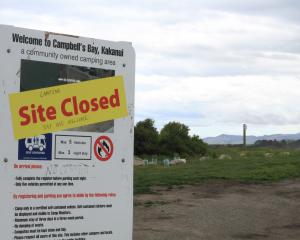The bylaw prohibits freedom camping in any towns or townships in the district.
Two people made verbal submissions to the Clutha District Council last week as it reviewed its bylaws.
New Zealand Motor Caravan Association (NZMCA) board member Gordon Murdoch spoke on behalf of the group, which represents more than 45,000 New Zealanders who roam the country in campervans.
He said the council's bylaw created a blanket ban across all urban areas, despite the large number of responsible freedom campers who created no problems and spent money in district towns.
He said some campervan companies were having their vans certified as self-contained, meaning they did not create waste issues.
His main concern was people using stationwagons and cars to freedom camp.
However, Diana Hodgkinson, who runs the Taieri Mouth Holiday Camp, said she supported the council's bylaw.
Mrs Hodgkinson said her camp offered discounts to self-contained campers, who usually generated no rubbish disposal costs and did not use the camp's facilities.
Cr Hamish Anderson questioned why the campers' stay was limited to two days, and suggested three nights would be better.
Councillors agreed to change it to three nights in a four-week period.
Cr Joanna Lowery said businesses could easily be added to the NZMCA's list of private areas where campers could stay.
She said it would be easier to remove the prohibited areas section in the bylaw.
Cr Stewart Cowie said there were already places within the district's towns where campers could pay to stay.
Clutha District Council planning and environment manager Murray Brass said there might be areas in towns across the district that provided the council "more flexibility" to make welcome to freedom campers within urban areas such as council freehold land.
Councillors voted to keep the prohibitions in the bylaw.
Mr Brass told the council issuing infringement notices was a real possibility through the Freedom Camping Act, although only authorised council officers had legal powers to move freedom campers on.
Mr Brass said the council had to review its bylaw provisions before November to comply with the Freedom Camping Act.
The regulatory services committee made some changes to the council's existing freedom camping policy then recommended the council adopt the updated policy at its next meeting.
The council will consider the amended bylaw on August 9.







